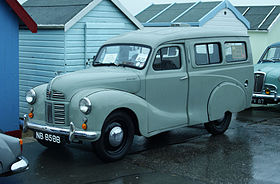
The Mini is a two-door compact city car that was produced by the British Motor Corporation (BMC) and its successors from 1959 until 2000. The original Mini is considered an icon of 1960s British popular culture. Its space-saving transverse engine and front-wheel drive layout – allowing 80% of the area of the car's floorpan to be used for passengers and luggage – influenced a generation of car makers. In 1999, the Mini was voted the second-most influential car of the 20th century, behind the Ford Model T, and ahead of the Citroën DS and Volkswagen Beetle. The front-wheel-drive, transverse-engine layout of the Mini was copied for other "supermini" designs including the Honda N360 (1967), Nissan Cherry (1970), and Fiat 127 (1971). The layout was also adapted for larger subcompact designs.
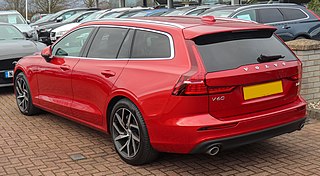
A station wagon or estate car, is an automotive body-style variant of a sedan/saloon with its roof extended rearward over a shared passenger/cargo volume with access at the back via a third or fifth door, instead of a trunk/boot lid. The body style transforms a standard three-box design into a two-box design — to include an A, B, and C-pillar, as well as a D-pillar. Station wagons can flexibly reconfigure their interior volume via fold-down rear seats to prioritize either passenger or cargo volume.

A hatchback is a car body configuration with a rear door that swings upward to provide access to a cargo area. Hatchbacks may feature fold-down second row seating, where the interior can be reconfigured to prioritize passenger or cargo volume. Hatchbacks may feature two- or three-box design.

The Austin Motor Company Limited was a British manufacturer of motor vehicles, founded in 1905 by Herbert Austin. In 1952 it was merged with Morris Motors Limited in the new holding company British Motor Corporation (BMC) Limited, keeping its separate identity. The marque Austin was used until 1987. The trademark is currently owned by the Chinese firm SAIC Motor, after being transferred from bankrupt subsidiary Nanjing Automotive which had acquired it with MG Rover Group in July 2005.

Jensen Motors Limited was a British manufacturer of sports cars and commercial vehicles in West Bromwich, England. Brothers Alan and Richard Jensen gave the new name, Jensen Motors Limited, to the commercial body and sports car body making business of W J Smith & Sons Limited in 1934. It ceased trading in 1976. Though trading resumed in 1998 Jensen Motors Limited was dissolved in 2011.
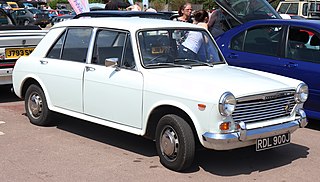
The BMC ADO16 is a range of small family cars built by the British Motor Corporation (BMC) and, later, British Leyland. Launched in 1962, it was Britain's best-selling car from 1963 to 1966 and from 1968 to 1971. The ADO16 was marketed under various make and model names; however, the Austin 1100 and Morris 1100 were the most prolific of all the ADO16 variants.

The Austin A90 Atlantic is a British car that was produced by the Austin Motor Company from 1949 to 1952. It was launched initially as a four-seat convertible, making its début at the 1948 Earls Court Motor Show in London, with production models built between early 1949 and late 1950. A two-door coupé, marketed as the A90 Atlantic sports saloon, followed a year later. It had been previewed at the 1949 Motor Show and was in production at Longbridge between 1950 and 1952.
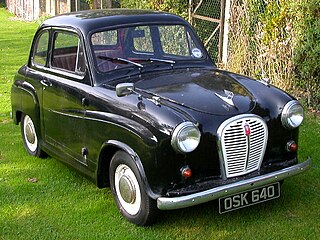
The Austin A35 is a small family car that was sold by Austin from 1956 until 1968. About 280,897 A35s of all types were produced.

The Austin A40 Farina is a small, economy car introduced by Austin in saloon (1958) and A40 Countryman (1959) estate versions. It has a two-box body configuration. It was badged, like many before it, as an A40, consistent with Austin's naming scheme at the time, based on the approximate engine output in horsepower; and to distinguish it from other A40 models, it was also given a suffix name – this one being the Farina, so named, reflecting the all-new design by Italian Battista Farina's Pinin Farina Turin studio.
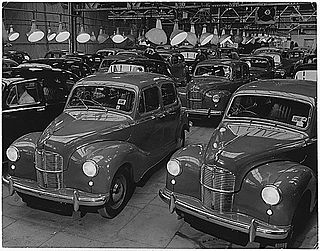
A number of different automobiles were marketed under the Austin A40 name by Austin between 1947 and 1967.

The A40 Devon are automobiles that were marketed by Austin from 1947 to 1952 – the first post-war saloons to be produced by Austin – featuring a mix of old and new technologies. They were previewed by the UK press at the Paris Motor Show on 22 October 1947, who expressed immediate disappointment at the car's conservative appearance. More than 450,000 were built before the model's replacement in 1952 by the Austin A40 Somerset.

See Austin A40 for other A40 models.

The Austin A40 Somerset is an automobile which was produced by the Austin Motor Company from 1952 until 1954. The Somerset replaced the Austin A40 Devon and, as a body-on-frame car, it was comparable in size to its predecessor. It shared a number of components with the Devon which included a similar 1.2 litre straight-4 pushrod engine. The Somerset's engine was updated to produce 42 hp (31 kW), compared to the Devon's 40 hp (30 kW), giving the car a top speed of 70 mph (110 km/h).
The Austin Cambridge is a motor car range produced by the Austin Motor Company, in several generations, from September 1954 through to 1971 as cars and to 1973 as light commercials. It replaced the A40 Somerset and was entirely new, with modern unibody construction. The range had two basic body styles with the A40, A50, and early A55 using a traditional rounded shape and later A55 Mark IIs and A60s using Pininfarina styling.

The Austin A70 Hampshire and later Austin A70 Hereford are cars that were produced by Austin of Britain from 1948 until 1954. They were conventional body-on-frame cars with similar styling to the smaller A40 Devon and A40 Somerset models respectively. 85,682 were built.

Turner Sports Car Company Limited was a 1950s British sports car manufacturer, that closed in 1966.

Mini is a British automotive marque founded in 1969, owned by German automotive company BMW since 2000, and used by them for a range of small cars assembled in England and Holland. The word Mini has been used in car model names since 1959, and in 1969 it became a marque in its own right when the name "Mini" replaced the separate "Austin Mini" and "Morris Mini" car model names. BMW acquired the marque in 1994 when it bought Rover Group, which owned Mini, among other brands.

The Wolseley Ten is a light car which was produced by Wolseley Motors Limited in 1939 and from 1945 to 1948.

The Mini Countryman, also called Mini Crossover in Japan, is a subcompact luxury crossover SUV, the first vehicle of this type to be launched by BMW under the Mini marque. It was launched in 2010 and received a facelift in 2014. The second generation vehicle was released in 2017.

The Sunbeam-Talbot Ten is a compact executive car or small sports saloon manufactured by Rootes Group in their Clément-Talbot factory in North Kensington between 1938 and 1939, and then reintroduced after the Second World War and sold between 1945 and 1948. It was at first a two-door then a four-door sports saloon. A drophead coupé version and a sports tourer version were also available.
